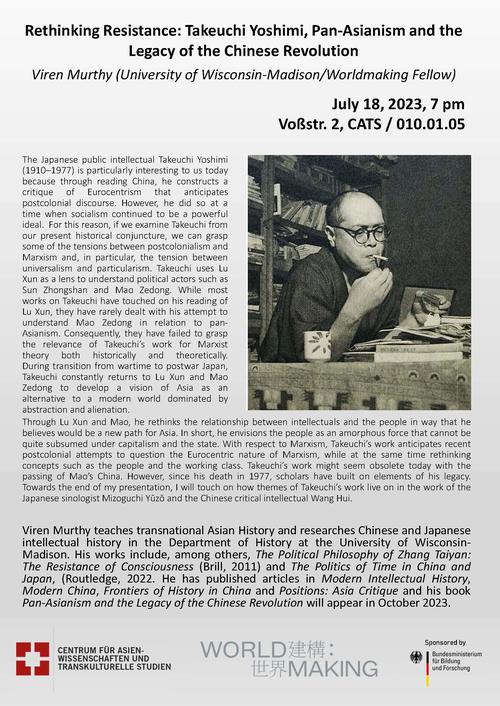Lecture "Rethinking Resistance: Takeuchi Yoshimi, Pan-Asianism and the Legacy of the Chinese Revolution" by Viren Murthy
Lecture "Rethinking Resistance: Takeuchi Yoshimi, Pan-Asianism and the Legacy of the Chinese Revolution" by Viren Murthy
The Japanese public intellectual Takeuchi Yoshimi (1910-1977) is particularly interesting to us today because through reading China, he constructs a critique of Eurocentrism that anticipates postcolonial discourse. However, he did so at a time when socialism continued to be a powerful ideal. For this reason, if we examine Takeuchi from our present historical conjuncture, we can grasp some of the tensions between postcolonialism and Marxism and, in particular, the tension between universalism and particularism. Takeuchi uses Lu Xun as a lens to understand political actors such as Sun Zhongshan and Mao Zedong. While most works on Takeuchi have touched on his reading of Lu Xun, they have rarely dealt with his attempt to understand Mao Zedong in relation to pan-Asianism. Consequently, they have failed to grasp the relevance of Takeuchi’s work for Marxist theory both historically and theoretically.
During transition from wartime to postwar Japan, Takeuchi constantly returns to Lu Xun and Mao Zedong to develop a vision of Asia as an alternative to a modern world dominated by abstraction and alienation. Through Lu Xun and Mao, he rethinks the relationship between intellectuals and the people in way that he believes would be a new path for Asia. In short, he envisions the people as an amorphous force that cannot be quite subsumed under capitalism and the state. With respect to Marxism, Takeuchi’s work anticipates recent postcolonial attempts to question the Eurocentric nature of Marxism, while at the same time rethinking concepts such as the people and the working class. Takeuchi’s work might seem obsolete today with the passing of Mao’s China. However, since his death in 1977, scholars have built on elements of his legacy. Towards the end of my presentation, I will touch on how themes of Takeuchi’s work live on in the work of the Japanese sinologist Mizoguchi Yūzō and the Chinese critical intellectual Wang Hui.
Speaker:
Viren Murthy (fellow in the project "A Translingual Conceptual History of Chinese Worlds") teaches transnational Asian History at the University of Wisconsin-Madison and researches Chinese, Japanese and Indian intellectual history. He is interested in critics of modernity in Asia, specifically, China, Japan and India. He places the history of nationalism and transnationalism in the larger trajectory of global capitalism and examines how pan-Asianists, Third Worldists, Marxists and postcolonialists theorize resistance to imperialism and capitalism and posit a world beyond the present. Central to his work is the politics of the nation-form. Pan-Asianists and Third Worldists believed that the nation-form would be able to combine anti-imperialism with a politics of socialism. He inquires into the conditions for the possibility of such theories in the early postwar period and the ask whether their categories and politics continue to be germane to our neo-liberal present. He is the author of The Political Philosophy of Zhang Taiyan: The Resistance of Consciousness (Brill, 2011) and The Politics of Time in China and Japan, Routledge, 2022). He is co-editor with Prasenjit Duara and Andrew Sartori of A Companion to Global Historical Thought, (Blackwell, 2014), co-editor with Joyce Liu of East Asian Marxisms and Their Trajectories (Routledge, 2017) and co-editor with Max Ward and Fabian Schäfer of Confronting Capital and Empire: Rethinking Kyoto School Philosophy (Brill, 2017). He has published articles in Modern Intellectual History, Modern China, Frontiers of History in China and Positions: Asia Critique, Jewish Social Studies, Critical Historical Studies, Journal of Labor and Society. His book, entitled: Pan-Asianism and the Legacy of the Chinese Revolution, is scheduled to appear in October, 2023 with University of Chicago Press.
Venue:
Heidelberg University, Voßstr. 2, CATS / 010.01.05

